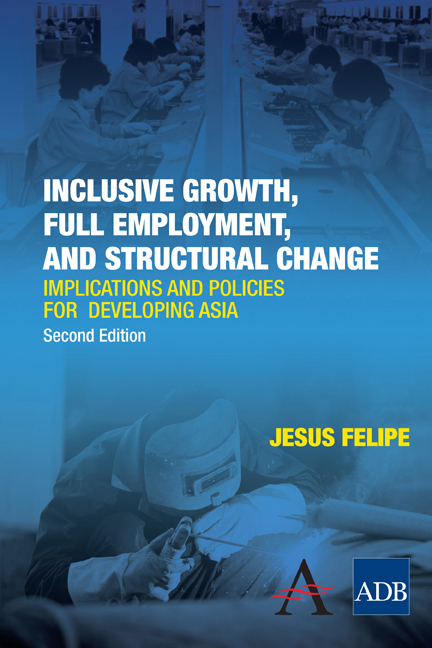 Inclusive Growth, Full Employment, and Structural Change
Inclusive Growth, Full Employment, and Structural Change Book contents
- Frontmatter
- Dedication
- Contents
- Illustrations
- Abbreviations
- Foreword
- Preface and Acknowledgments
- Executive Summary
- Chapter 1 What Is Inclusive Growth?
- Chapter 2 What Is the Main Constraint that Developing Countries Face?
- Chapter 3 Why Full Employment and Who Should Be Responsible for Trying to Achieve It?
- Chapter 4 Why Is Growth Unstable?
- Chapter 5 What Is the Role of Agriculture in the Process of Structural Change and in Delivering Full Employment? Full Employment I
- Chapter 6 What Is the Role of Investment in Delivering Full Employment? Full Employment II
- Chapter 7 Why Is “Planning Development” Necessary?
- Chapter 8 What Is Industrial Policy? Full Employment III
- Chapter 9 Structural Transformation, Industrialization, and Technological Change in Developing Asia: What Does the Empirical Evidence Show?
- Chapter 10 Why Do Export Diversification and Sophistication Matter?
- Chapter 11 Unemployment Versus Inflation: Which One Should Be the Public Enemy Number One?
- Chapter 12 What Should Be the Role of Fiscal and Monetary Policies for Development? Full Employment IV
- Chapter 13 Is It Possible to Achieve Full Employment in the Presence of Structural Transformation?
- Chapter 14 Should the Government (Public Sector) Intervene Directly and Become the Employer of Last Resort? Full Employment V
- Chapter 15 Can Competitiveness and Globalization Deliver Inclusiveness and Full Employment?
- Chapter 16 Export-Led Growth or Domestic Demand–Led Growth?
- Chapter 17 Is Education a Key Ingredient of Inclusive Growth?
- Chapter 18 Conclusions: How Can Developing Countries Implement an Inclusive-Growth and Full-Employment Strategy?
- References
- Author Index
- Subject Index
Foreword
Published online by Cambridge University Press: 10 September 2020
- Frontmatter
- Dedication
- Contents
- Illustrations
- Abbreviations
- Foreword
- Preface and Acknowledgments
- Executive Summary
- Chapter 1 What Is Inclusive Growth?
- Chapter 2 What Is the Main Constraint that Developing Countries Face?
- Chapter 3 Why Full Employment and Who Should Be Responsible for Trying to Achieve It?
- Chapter 4 Why Is Growth Unstable?
- Chapter 5 What Is the Role of Agriculture in the Process of Structural Change and in Delivering Full Employment? Full Employment I
- Chapter 6 What Is the Role of Investment in Delivering Full Employment? Full Employment II
- Chapter 7 Why Is “Planning Development” Necessary?
- Chapter 8 What Is Industrial Policy? Full Employment III
- Chapter 9 Structural Transformation, Industrialization, and Technological Change in Developing Asia: What Does the Empirical Evidence Show?
- Chapter 10 Why Do Export Diversification and Sophistication Matter?
- Chapter 11 Unemployment Versus Inflation: Which One Should Be the Public Enemy Number One?
- Chapter 12 What Should Be the Role of Fiscal and Monetary Policies for Development? Full Employment IV
- Chapter 13 Is It Possible to Achieve Full Employment in the Presence of Structural Transformation?
- Chapter 14 Should the Government (Public Sector) Intervene Directly and Become the Employer of Last Resort? Full Employment V
- Chapter 15 Can Competitiveness and Globalization Deliver Inclusiveness and Full Employment?
- Chapter 16 Export-Led Growth or Domestic Demand–Led Growth?
- Chapter 17 Is Education a Key Ingredient of Inclusive Growth?
- Chapter 18 Conclusions: How Can Developing Countries Implement an Inclusive-Growth and Full-Employment Strategy?
- References
- Author Index
- Subject Index
Summary
World poverty is closely related to unemployment and underemployment. This is especially the case in developing Asia, where about 500 million unemployed and underemployed people have to cope without significant government welfare support. Recently, institutions such as the World Bank and the Asian Development Bank have started using the term inclusive growth in setting their policy agendas. In this book, Jesus Felipe argues that if policy makers across developing Asia care about inclusive growth defined as growth with equal opportunities, then achieving true full employment should become the paramount objective of Asian governments.
The best strategy to reduce poverty in developing Asia is to introduce a set of policies that will generate full employment. While a number of policy initiatives will be useful—particularly those that target productivity improvements in agriculture and stimulate investment in industry, and those that condition the broader macroeconomic environment (monetary, fiscal, and exchange rate policies)—the key is to coordinate their implementation to ensure that they pull the economy toward full employment.
This policy mix is important because ongoing structural change, the key to development, makes the attainment of full employment a moving target and governments are continually confronted with political and economic choices that at times seem to be conflicting. But at all times, the policy process must aim at ensuring that there are enough jobs available to meet the needs of the labor force.
Agriculture remains the largest employer in many Asian countries, including the two largest developing economies, i.e., India and the People’s Republic of China. It is thus clear that any viable development plan must place special focus on agriculture. Any such plan has to involve investment initiatives that improve agricultural productivity and alternative job creation strategies that provide opportunities for rural workers displaced by technological advances. These job creation initiatives must take into account the effects of structural change if full employment is to be achieved. Localized job creation programs will also be necessary to ensure that urban structures are not flooded with workers displaced from the modernized agriculture sector.
- Type
- Chapter
- Information
- Inclusive Growth, Full Employment, and Structural ChangeImplications and Policies for Developing Asia, pp. xiii - xviiiPublisher: Anthem PressPrint publication year: 2010


